Boosting Energy Efficiency: A Guide to Choosing Hybrid Grid Solar Systems
In today’s rapidly evolving energy landscape, optimizing energy efficiency is more critical than ever. One of the most promising solutions for achieving this goal is the hybrid grid solar system. This advanced technology combines the benefits of solar power with the flexibility of grid integration, offering a robust solution for both residential and commercial energy needs. In this guide, we’ll explore how to choose the best hybrid grid solar system to enhance your energy efficiency.
What is a Hybrid Grid Solar System?
A hybrid grid solar system integrates solar photovoltaic (PV) panels with energy storage and grid connectivity. Unlike traditional solar setups that are solely dependent on the grid or off-grid systems that rely entirely on solar energy, hybrid systems offer the best of both worlds. They harness solar power, store excess energy for later use, and allow for seamless integration with the electrical grid. This flexibility provides a reliable and efficient energy solution that can adapt to various energy demands and supply conditions.
Key Components of a Hybrid Grid Solar System
Solar PV Panels: The heart of any solar system, these panels capture sunlight and convert it into direct current (DC) electricity. In a hybrid system, they provide a primary source of renewable energy.
Energy Storage System: Typically consisting of high-capacity batteries, this component stores excess solar energy generated during peak sunlight hours. This stored energy can be used during periods of low solar production, such as nighttime or cloudy days.
Inverter: An essential component, the inverter converts DC electricity from the solar panels and storage system into alternating current (AC) electricity, which is used by most home and business appliances.
Grid Connection: The hybrid system’s connection to the electrical grid allows for the export of excess energy or import of power when solar production is insufficient.
Energy Management System: This smart technology optimizes the flow of electricity between the solar panels, storage system, grid, and your appliances to ensure efficient energy use and minimize costs.
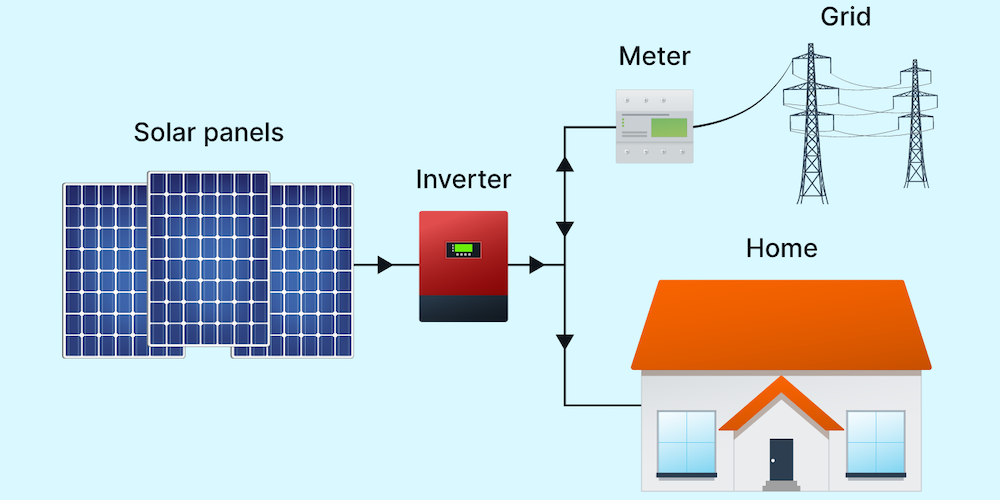
Benefits of a Hybrid Grid Solar System
Enhanced Energy Efficiency: By combining solar power with energy storage and grid integration, a hybrid system maximizes the use of renewable energy while reducing dependence on traditional power sources. This results in lower energy costs and reduced environmental impact.
Increased Reliability: Hybrid systems provide a backup power source when the grid is down or during periods of low solar production. This ensures a continuous energy supply, improving overall reliability.
Cost Savings: With the ability to store and use solar energy during peak pricing periods, hybrid systems help reduce electricity bills. Additionally, government incentives and rebates for solar installations can further enhance cost savings.
Flexibility and Scalability: Hybrid systems can be customized to meet specific energy needs and scaled up as those needs change. This adaptability makes them suitable for various applications, from small residential setups to large commercial installations.
Environmental Impact: By utilizing renewable solar energy, hybrid systems contribute to a reduction in greenhouse gas emissions and support global sustainability goals.
How to Choose the Right Hybrid Grid Solar System
Assess Your Energy Needs: Determine your energy consumption patterns and peak usage times. This will help you choose a system with the appropriate size and capacity to meet your needs.
Evaluate Storage Options: Consider the type and capacity of the energy storage system. Higher capacity batteries offer more flexibility but may come at a higher cost. Choose a system that balances your energy storage needs with your budget.
Check Inverter Quality: The inverter plays a crucial role in converting and managing electricity. Select a high-quality inverter that matches the specifications of your solar panels and storage system.
Review Grid Connectivity: Ensure that the hybrid system is compatible with your local grid regulations and can integrate seamlessly with your existing electrical infrastructure.
Consider Future Expansion: Choose a system that allows for easy upgrades or expansions. As energy needs grow or technology advances, being able to scale your system will be beneficial.
Conclusion
A hybrid grid solar system offers a powerful solution for boosting energy efficiency and achieving sustainable energy goals. By integrating solar power with advanced energy storage and grid connectivity, these systems provide a reliable, cost-effective, and environmentally friendly energy solution. When choosing the right system, consider your energy needs, storage options, inverter quality, grid connectivity, and potential for future expansion. With the right hybrid grid solar system, you can enjoy enhanced energy efficiency and a more sustainable energy future.
Contact us
- Email:[email protected]
- Tel: +86 13651638099
- Address: 333 Fengcun Road, Fengxian District, Shanghai
Get A Quote Now!
Related product links are available directly
Site storage products:Site storage products 归档 – (energystoragecontainer.com)
Lithium Battery:Lithium Battery 归档 – (energystoragecontainer.com)
Read more
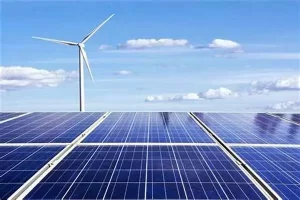
Unveiling Photovoltaic+Energy Storage: Four Major Application Scenarios Leading the Future of Energy
In this way, the energy landscape is evolving, and one of the most thrilling developments in renewables is the integration of photovoltaics energy storage.
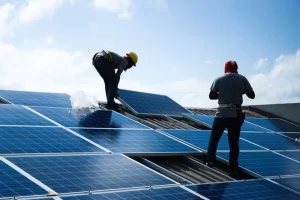
From Theory to Practice: Four Methods for Estimating Photovoltaic Power Generation
Photovoltaic power generation has become an essential part of modern energy solutions, particularly in home solar systems and distributed power applications
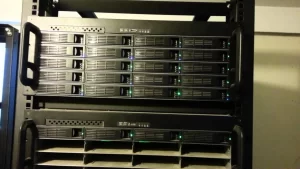
Rack-Mounted Lithium Iron Batteries: Creating Efficient and Reliable Energy Storage Solutions
When it comes to modern energy solutions, rack-mounted lithium iron batteries are taking center stage in a variety of industries. Whether you’re powering data centers, stabilizing energy for households, or keeping critical systems online at 5G base stations, these batteries have become the unsung heroes of our electrified world.
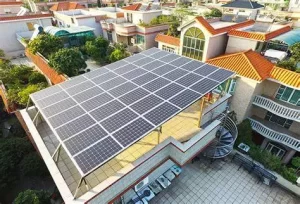
Late Night Energy Saving Tips: How to Maximize Electricity Savings During Off-Peak Hours
With rising energy costs, homeowners are increasingly exploring innovative ways to save on their electricity bills. One effective approach is utilizing off-peak hours—times when electricity rates are significantly lower due to reduced demand.
